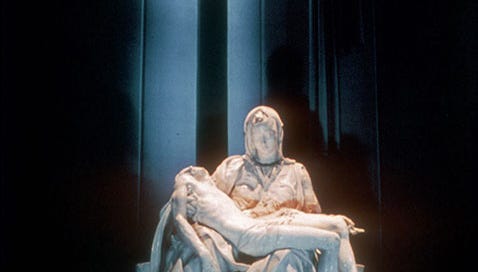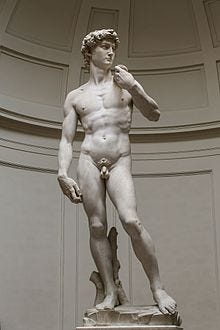When I was ten years old my parents took me to the New York World’s Fair. I remember only one thing from that experience: the massive and incredibly beautiful sculpture of the Blessed Virgin holding her dead son, Jesus, by Michelangelo: the Pietà. I cannot honestly say that I mused, as I stood before the work, with wonder at the intricacies of representation of the forms, but something must have struck me as I stood before it.
Approximately ten years later I admired the great work again on my first visit to Rome, in 1975. Then, in the summer of 1982, months before beginning medical school, I sojourned to Italy, and while in Florence had the opportunity to see Michelangelo’s David. I spent at least three hours examining the towering depiction of the slayer of Goliath on that visit, figuring that it might be many years before I’d have another chance. And so far I have not had that chance, so these three hours were hours very well spent.
Michelangelo’s work comes to mind because earlier today in conversation with a friend the subject of sculpture arose, and artistic skill, and I wondered who today could chip and hew a block of marble with such fineness and precision so as to depict the faces, hands, limbs, musculature and even minute anatomical details we see in these magnificent works created over five hundred years ago. It is one thing to mould in clay or plaster and cast in bronze, but it is another thing to chisel directly from stone and draw from it an essence residing within.
Which led me to another memory in another museum, back in Philadelphia, where I learned that a well-executed portrait had been painted from a photograph of the subject that had been projected onto the canvas — again, a process vastly different from, for example, the one employed when Leonardo depicted his famous Mona Lisa, or when any number of Renaissance artists assayed their subjects.
What really set me off on these meanderings, however, was listening to a pundit laud our modern era, primarily for its technological achievements, while deprecating the peoples of the Stone Age. No doubt there is quite a contrast. But was the human spirit essentially different? Did people not love, show tenderness, aspire, play or sing?
We know for sure that the civilizations of Ancient Greece, despite their limited scientific expertise and technological prowess, produced poetry and drama and philosophy of the highest order.
We, on the other hand, in our glorious now of computational intelligence, with capabilities of apocalyptic weaponry and biological modification — are we so much superior? Do we love any more fully. Do we think more deeply? Do we feel with greater intensity or complexity?
Or not?
From my particular psychological perspective, one may view every technological advance as a means of lessening human effort, of reducing the formerly vast distance between thought and deed, between imagination and accomplishment, to an ever-diminishing minimum. We can, in fact, do more and more with less and less, so that the weight of a finger upon a button can launch a missile killing thousands of people miles away. We are altering genders — and genomes. We are fast approaching, with every leap and bound of science, the state where the demarcation between wishes and realities may be dissolved — a state of thought-omnipotence equaling God-like power.
Is this our end, our ultimate aim, the culmination of our human trajectory? Is this where the Tower of Babel leads? Can the blandishments of convenience and power ever be conquered by restraint?
The course upon which we, as a species, find ourselves, with exponentially accruing accomplishment, leads to one end: extinction. Because if we pursue what we have been pursuing to its finality, we will be no more. We will have achieved, with such progress, nothing less than the most immense regression to the first stages of infancy, that inchoate world where wish and wish-fulfillment blend. Thus, our so-called immortality.
Knowledge is revered because it confers mastery. Yet how much more do we need to know? How much faster do we need to travel? How much higher do we need to jump? How much effort needs to be reduced?
In a now-famous article published in 2010, investigative journalist Matt Taibbi described investment bank Goldman Sachs as “a great vampire squid wrapped around the face of humanity, relentlessly jamming its blood funnel into anything that smells like money.”
But there is an even greater and more-encompassing and vastly more ominous creature sucking the life and brains and energy of virtually every human activity into its endlessly cavernous maw: it’s the Internet. It seems that nothing can be done without it — trains can’t run, planes can’t fly, cars may soon not be able to be driven, schedules can’t be made, government agencies can’t operate, mail can’t be delivered, Ubers can’t be hailed, water can’t flow ... since when, and why?
How did the world function at all before this digitally devouring behemoth?
How did a human being, using simple primitive instruments, carve from implacable stone transcendent icons of the human spirit?
Perhaps some wise groups will convene to halt our headlong rush to blissful nothingness. Perhaps we people on the ground will balk before the swallowing centralized Web, and just say no so we can till our little fields, and gather face to face, and take our notes in longhand, and make the greatest virtue of restraint.
Emanuel E. Garcia, M.D.
November 2024





Cash is not just. Convenience, it is physical interact, harder to steal than digital, already taken token.
Taxicabs don't need but a flag or hail of put your arm up. They destroyed my taxi company when I ran for mayor of SF. ScKamala Harris gave me solitary isolation.
Now uberrlyftwhores rule with nowhere to go, even driverless....
I ran against care not cash Gavin Gruesome Newsom, I lost my taxi business and went to jail.
Now we have scamdemic Harmacide care not cash. We have war galore.
WHat I spoke out against has been held against all of us now, and I must basically be silenced forever.
As Womanity is silenced....
Again, your musings warm my heart. Thank you.